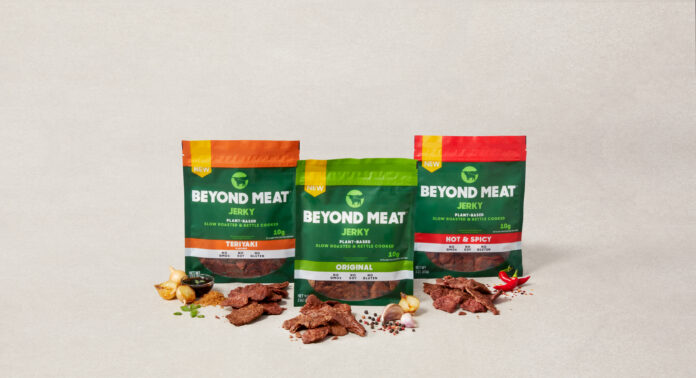When Beyond Meat Inc. announced plans to develop snacks and beverages with PepsiCo Inc. in January last year, its shares rallied 20%, boosting the company’s market value to about $11 billion.
The partnership bore fruit last month, with Beyond Meat Jerky debuting on grocery store shelves nationwide, providing another revenue stream for the El Segundo-based maker of plant-based meat alternatives.
The plant-based snack “took an enormous amount of time and energy to get ready,” Chief Executive Ethan Brown told analysts during an earnings call. “It’s a fantastic product that’s going to bring excitement to the retail space. And we have some other products that come out later this year, so you’ll see us get back on the retail game in a big way in ’22.”
Perhaps not a moment too soon. These days Beyond Meat’s market value hovers below $3 billion after several analysts recently dropped their price targets for the company stock. The collective concern centers on lackluster retail sales, production glitches that helped widen its net losses and apparent underwhelming reception of McPlant, a burger McDonald Corp. co-developed with Beyond Meat that’s sold in test markets in California and Texas.
The company’s revenue last year came to nearly $465 million, a 14% increase compared to 2020. Net loss for the year was $182 million, much worse than the $52 million loss it notched in 2020. Domestic retail sales were down 7.9% to $243 million, while food service revenue, which includes restaurants, was up 26% to $76 million.
“The key question is whether this reduced growth rate is an aberration or a harbinger of things to come,” Brown said. “As our 2022 guidance suggests, we believe last year’s growth rate to be temporary and that growth will build to higher levels this year.”
He added that Beyond Meat will resume robust in-store sampling this year, launch new products and start the “most comprehensive marketing program to date” that will tie into relevant advertising by some of its larger quick-service reseller partners.
“We are highly confident that these investments in terms of team, infrastructure, product scaling and more generally setting up strategic partnerships for success, will generate strong returns in the years ahead,” Brown said. “If 2021 was a year of investment in scaling as we planned for the resumption and expansion of market activity, 2022 is the year of execution.”
Rebecca Scheuneman, an equity research analyst at Morningstar Inc. in Chicago, shared his optimism, especially for the international market, where the company’s retail sales grew 123% to $81.4 million last year, and foodservice revenue totaled $63.3 million, a $39% uptick.
“We see the international market as a very significant opportunity and I think a lot of investors are kind of overlooking that,” Scheuneman said. “There’s a very strong demand for plant-based meat overseas, and Beyond Meat recently opened capacity in Europe and in China. They’re well positioned to meet this growing demand.”
She added that the U.S. market “still represents a pretty good opportunity” for Beyond Meat, despite the drop in sales over the last couple of quarters.
“Investors seem to be pretty concerned about the slowdown of plant-based meats in U.S. retail, but I’m actually not that concerned about it,” Scheuneman said. “I think that the real reason for the slowdown is that there was just an enormous surge in sales of the products in 2020, when consumers shifted their consumption (from) eating out at restaurants to retail, and there was such a significant surge. …The category still grew 8% according to our data at Morningstar that we follow in 2021, despite the fact that consumers really shifted their food consumption back to restaurants.”
Scheuneman added that writing off McPlant amid reports of about McPlant not meeting expectations in the test markets might be premature.
“We think that that will increase in time as well,” she said. “It really hasn’t been advertised and the McPlant has launched nationwide across the U.K. and Ireland, and the product’s selling very well there. And one of the primary differences is in the U.K. and Ireland it’s supported with a significant advertising campaign.”
Last month’s launch of Beyond Meat Jerky should also help boost the retail sales.
“I think it’s a great move,” Scheuneman said. “Pepsi, like Beyond Meat, recognizes the growing demand for plant-based meat, (which is) significantly more environmentally friendly than traditional animal proteins and for younger consumers in particular the environment is a significant priority for them. And we expect that as they continue to get educated on the environmental benefits of plant-based meats over traditional animal proteins, that the demand for these products will continue to grow.”

